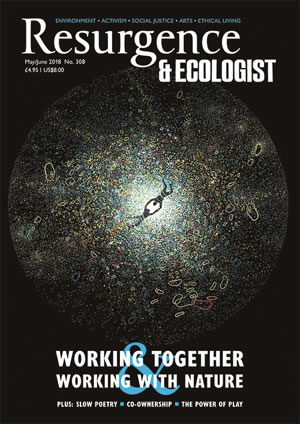Ghassan Hage is a Lebanese-Australian who is Future Generation Professor of Anthropology and Sociology at the University of Melbourne. In Is Racism an Environmental Threat? Hage, who has written extensively about ‘race’ (a social construct rather than something that actually exists), describes his stance as “slightly unusual” – he argues that racism is connected to the ecological crisis: both have roots in domination, colonialism and capitalism. Both come from the same mode of inhabiting the world, and each supports and reinforces the other. Anti-racist and ecological struggles, therefore, are intrinsically linked. The main concept of this book is of “generalised domestication” – a way of inhabiting the world through dominating it and making it yield value. Hage draws on a wealth of interlinking theories and sub-theories to demonstrate his convincing central argument.
He begins by arguing that racism (specifically Islamophobia, which he posits as today’s dominant form of racism) is related to the environmental crisis, as both involve the exploitation of humans and Nature. Hage warns of the need to understand the use of animal metaphors in relation to the racialised Other, as they reveal the nature of racist classification. Racism itself, he argues, is not a crisis and only becomes one when it fails to do its job of keeping the racialised Other in his or her place. For example, American anti-black racism is “always tinged with a sense of panic”, as there is a fear of losing long-established power.
The book shows how the world was divided into two very different realities during colonial times – that of slave and that of master. For some it is a world of national borders. Yet the (largely white) upper class “are made to feel truly at home in the world”. Colonised Others have been seen in turns as exploitable, dangerous and exterminable. Today, the Muslim is portrayed as an increasing threat, an ungovernable, lurking ‘wolf’ that stops us feeling at home (the aim of generalised domestication).
The book is written in the essay tradition, from a historical, sociological, anthropological and political perspective. It draws on a wealth of secondary sources and is well written and lucid. The arguments are fairly straightforward, and well illustrated. However, the use of language drawn from a highly academic, expert and subject-specific vocabulary may alienate non-academic readers. This is a shame, as many important conversations around ‘race’, animal welfare and the environment are currently taking place outside academia.
The arguments are convincing. Although some may find it controversial, it seems entirely logical to explore the link between racism and speciesism. It is also logical to argue that the same forces have moved across the globe, dominating and exploiting people, animals and Nature for the extraction of value. My main criticism would be that it is not completely clear why the focus is on Islamophobia – colonial racism continues to impact on all people of colour.
The book concludes by offering an alternative way of making ourselves at home in the world. The problem lies, Hage argues, not with generalised domestication itself, but in the way it has been favoured in modern times. We need to aim instead for multiple modes of inhabitance. He draws on the concept of mutuality from anthropologist Marshall Sahlins’ work on kinship to demonstrate that we can participate in each other’s existence, that the boundaries between the self and the Other, human and animal can be less absolute: ‘in me’ instead of ‘for me’. He also draws on sociologist Marcel Mauss’s work on ‘inter-giftedness’ – people, animals, plants and objects can exist as gifts for one another. We have become unable to see solutions other than through the lens of generalised domestication.
The aim of the book was to encourage readers to look at things differently and provide better ways of negotiating the problems. Hage has certainly achieved this – readers are left with a sense that the world they have long taken for granted has been turned upside down.







